Taylor Clyne Smith
"People think you need to go to the mainland for opportunities, and if Kennedy has that ambition, that’s fine. But there are opportunities at your doorstep if you take a moment to realise it. It’s up to us as parents to show them."
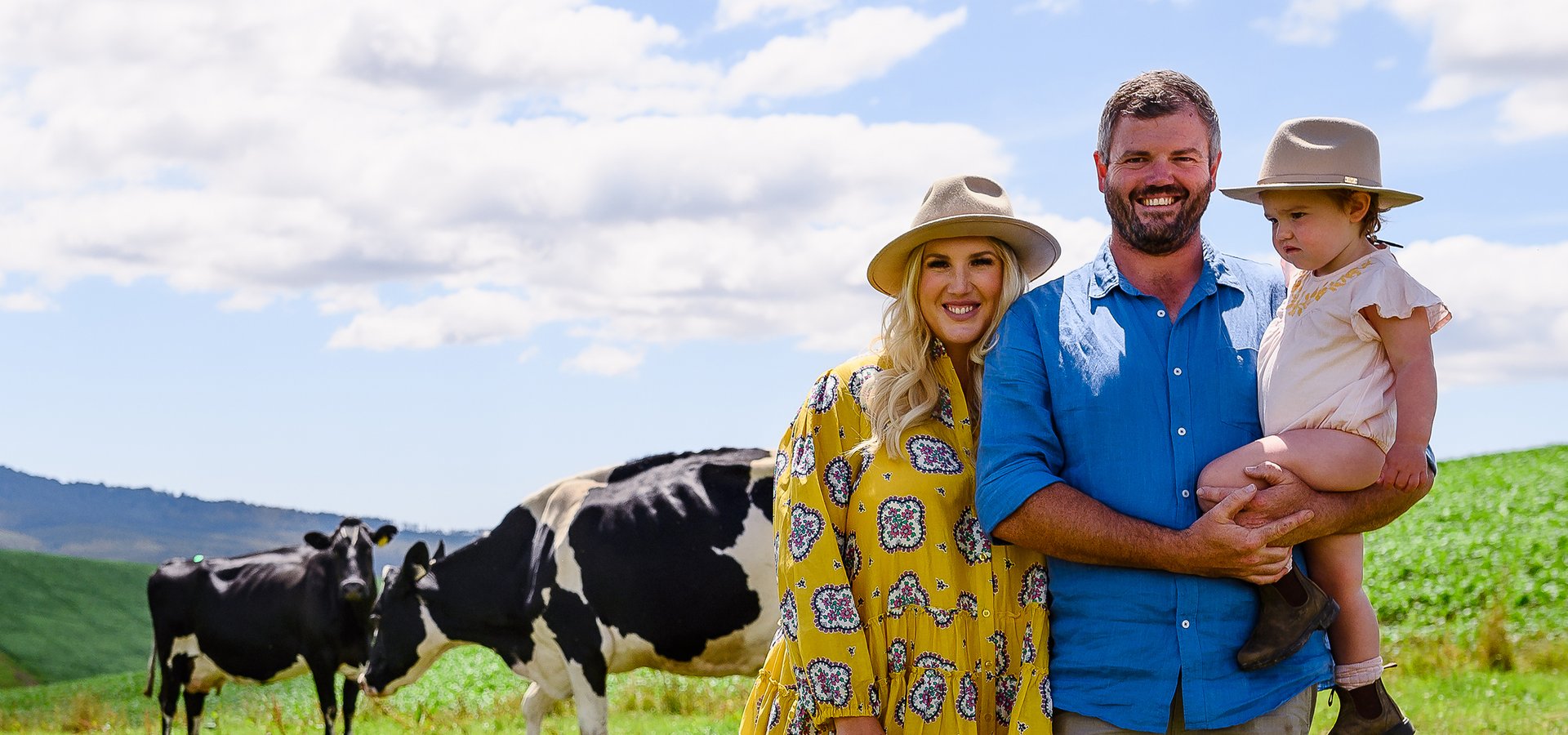
"Every journey is different. Every baby is different. Every life is different. You’ve got to look after yourself and recognise what your needs are. To keep dialogue open and work as a team. Tomorrow is a new day, and it’s going to be ok."
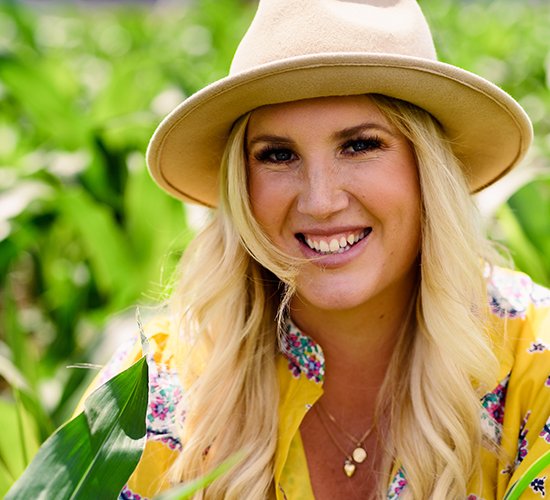
Not long ago, Taylor Clyne Smith stumbled across some old journals from her student years at Brooks High School, near Launceston.
She unearthed an assignment about what she wanted to be when she grew up. Reading through the dreams and plans of her childhood self, she realised that everything she wrote in Grade 9 and 10 had come true. “I just knew,” she laughs. “Well, except for the part about being Jennifer Hawkins on Getaway – that part didn’t happen.” Taylor wanted to work in the media and be paid to travel. She got a job with The Examiner newspaper just out of Grade 12 and started working in radio. “Then, I met a farmer, and everything changed.”
Taylor has a lifelong connection to rural Tasmania. She grew up in Windermere, outside of Launceston. She loved school, and riding horses was one of her earliest passions. “I used to get home off the bus, saddle up my horse, ride it down the road and wait at the bottom of the hill for the private school bus to come. The bus driver knew me, and he’d wait for me. You could never do it these days, but I’d race them to the top of the hill on my horse every afternoon after school.”
She and her husband, Jarrod, met near his family’s farm in Winnaleah, one and a half hours from Launceston. Taylor was just 21 years old, but she had big ambitions. When their relationship became more serious, they were faced with a tough decision. The family farm wasn’t going anywhere. But Taylor insisted she would pursue her media career.
Then, a bit of luck came their way. The 65-year-old editor of the North-Eastern Advertiser, a Scottsdale-based local newspaper, decided to retire. Taylor applied and got an interview. She didn’t end up getting the job, but the owners were so impressed, they created a full-time role for her. “I’ve just worked really hard, and I’m determined; I think all you need is a positive personality and a can-do attitude, and you can get anywhere in life.” Taylor moved to Winnaleah right away. She loved working for a community newspaper and serving as North-east correspondent for the ABC. “I was very lucky to work there, because you get to do every story you could imagine: human lifestyle, politics, sport, fashion, (God forbid) farming – whatever you like. It’s a dream job.” At age 24, she became the Editor.
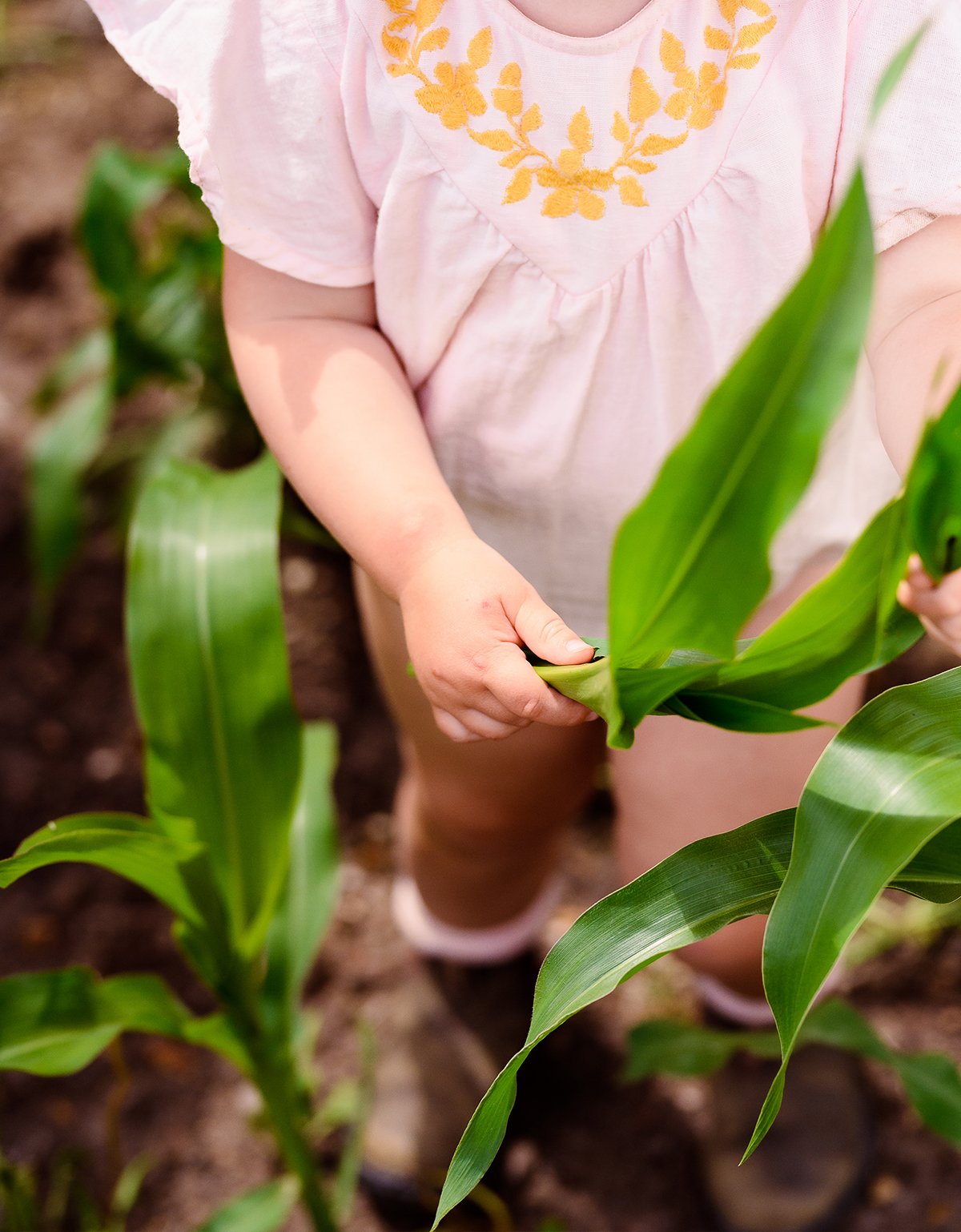
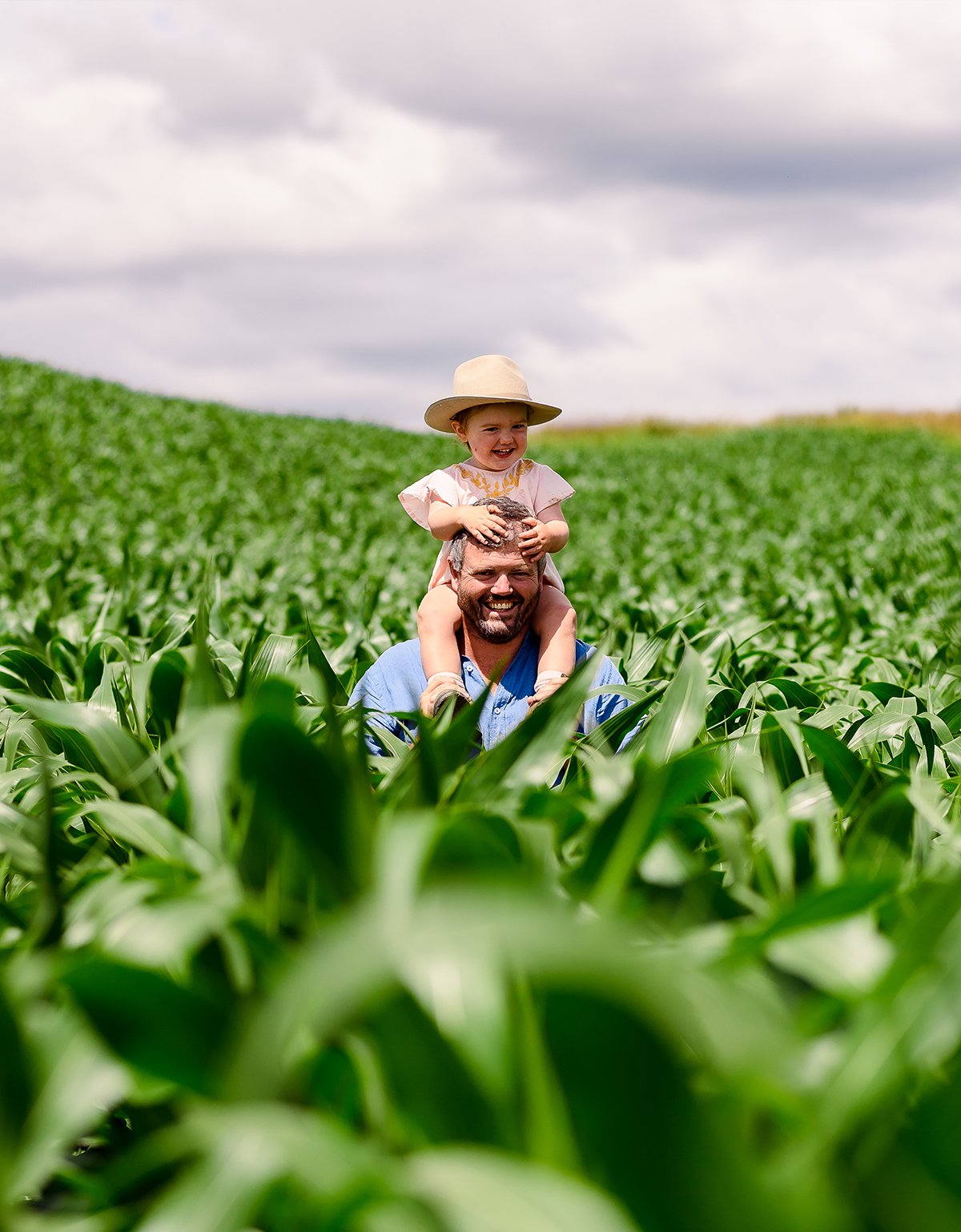
Taylor and Jarrod had only been together for six months when they started renovating the farmhouse they live in now. It is a sunny, open space overlooking horse pasture. Their home gives the feeling it is looked after with love and care. The project was an early experience of how Jarrod and Taylor work as a team. “I remember we had this conversation about what would happen if we didn’t work out. It was very practical, because, six months in, who knew where things would be in three years. He was like, ‘this is a family farm, you can’t exactly take it with you.’” They agreed Jarrod would cover the renovations and Taylor would pay for everything inside the house. “It was great being pragmatic like that,” she remembers. “We’re still great like that.”
They travelled the world together and got married six months after Jarrod proposed. Their daughter, Kennedy, arrived two years later. “Everything turned on its head,” she says. “It was the biggest shock to everyone’s system in this household, including the dog! Suddenly you need to do everything for this little being. You have no idea what it involves until you’re in it yourself.”
Kennedy had severe colic for the first three months, and she “cried and cried and cried.” And then there was the constant, seemingly endless quest for sleep. “People say, ‘oh, you won’t get any sleep.’ But what does that actually mean to your body, your relationship, your life, or your baby? Jarrod and I had to band together as a team, sleeping in four-hour shifts for the first few weeks. We were just trying to work out how to get through it so people could sleep.”
Being a farming family with a newborn was no small task. The farmhouse in Winnaleah is surrounded by fields and pastures brimming with dairy cattle and food crops. Jarrod manages all of that, plus a contracting business for other farms too. In the October to February busy season, he works long hours, with nights and sometimes weeks away. Figuring out how to balance farming and parenting wasn’t easy. For Taylor, it was about learning what it takes to run a farm. “You can’t afford to pay other people to do it – you just wouldn’t have a farm then. He needs to do these things; he can’t stay to help even if I need it. I felt resentment in the first few months: Why do you get to live all of your life like it hasn’t changed, while I’m here, and everything has changed for me? I couldn’t ride my horse – maybe that seems trivial, but, to me, it was such an important part of myself. I needed to get out of the house.”
Jarrod and Taylor focused on how to make Kennedy a part of their lives, so they could give her the best possible childhood and still keep a sense of self. “We wanted to do stuff together as a family, but also just him and me. It wasn’t just going out to have tea; we actually needed to be us again.” They found ways to get time together. Taylor took Kennedy to visit Jarrod while he was at work on the farm, the three of them riding around in the tractor. They found ways to include Kennedy, to show her where her food comes from. “She watches the cows being milked and sees milk come out of the vat into the jug. She helps dig potatoes. We take her wood cutting, and she stacks the sticks and “supervises” lighting the fire. Even if you don’t live on a farm, that’s the beauty of Tasmania – you can drive past a herd of cows and tell the same story.”
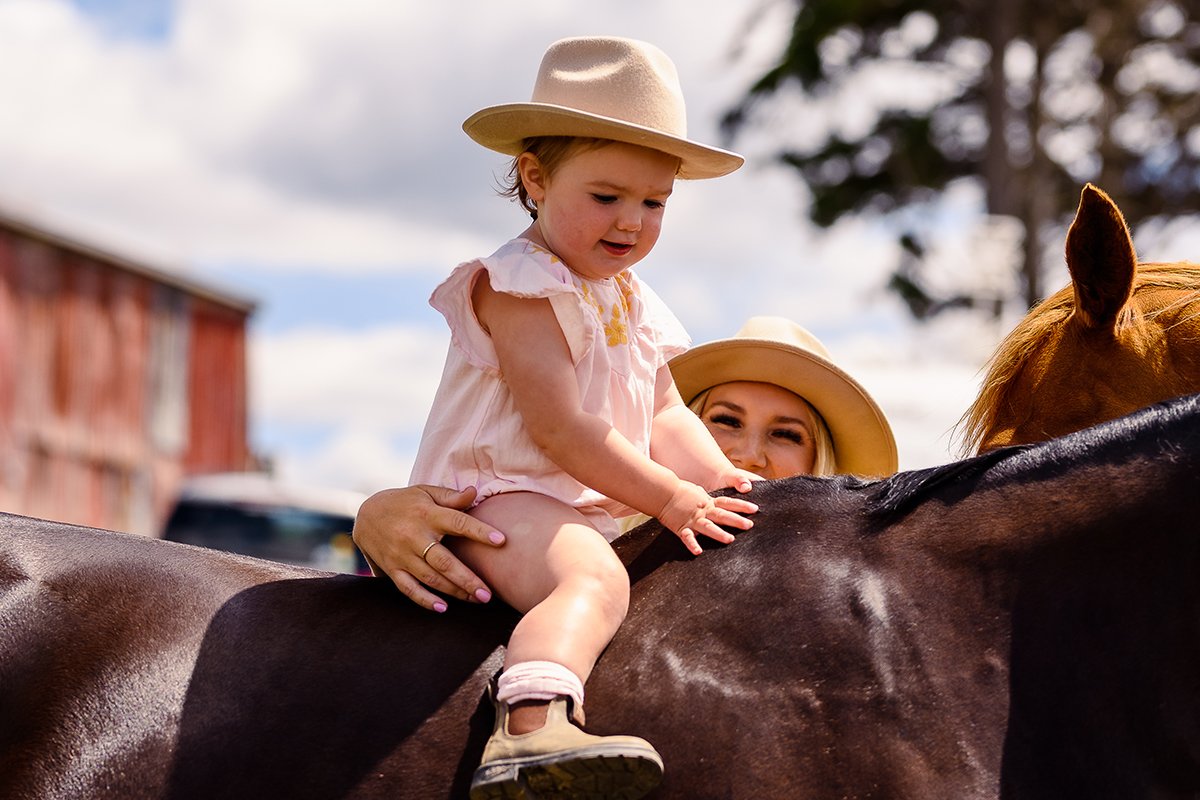
As Kennedy got older, Taylor was able to organise friends to visit with their horses, so she could go riding and Kennedy could nap at home. Their generosity caused her to reflect on how friendships change. “It’s the people who come before you and friends who get around you. People who don’t make you feel like bringing your baby along is a burden, who genuinely interact with your child. The people I knew who had babies, I didn’t help them enough,” she recalls. “I didn’t know to know, if that makes sense.”
Returning to work was exciting but filled with the tensions many parents and primary caregivers face. “My life had changed so much. Everything was about this little person now. I couldn’t imagine leaving her, and I was so nervous on the first day. Then I got there, and I was like, oh my gosh, this is a holiday!” Working at a local newspaper created a community network that made returning to work easier. “My main worry was being respected as a journalist,” she says. “I wanted to be able to give that person the experience they deserve, to listen to them when they’re telling their story.” She was able to take Kennedy with her to interviews and find ways to make it work.
Taylor and Jarrod love raising Kennedy in Tasmania. Finding childcare can be a big (and costly) challenge, and driving long distances can be tough. But Taylor has found that most folks are excited to see young children growing up in small towns, and there’s usually someone around to help. “People think you need to go to the mainland for opportunities, and if Kennedy has that ambition, that’s fine. But Tassie has it all. There are opportunities at your doorstep if you take a moment to realise it. Your pathways are here. You have a future here. It’s up to us as parents to show them.”
For now, Taylor is taking things one day at a time. Soon, they will be a family of four, and their lives and routines will change again. For Taylor, accepting chaos is just part of it. “Every journey is different. Every baby is different. Every life is different. You’ve got to look after yourself and recognise what your needs are. To keep dialogue open and work as a team. Children are sponges. How we feel, act, and speak to each other ripples into the little eyes that are watching on. We don’t always get it right, but we’re surviving! And everything is temporary. It does get easier. Tomorrow is a new day, and it’s going to be ok.”
We worked with southern Tasmanian photographer Moss Halliday-Hall for this Tasmanian story.